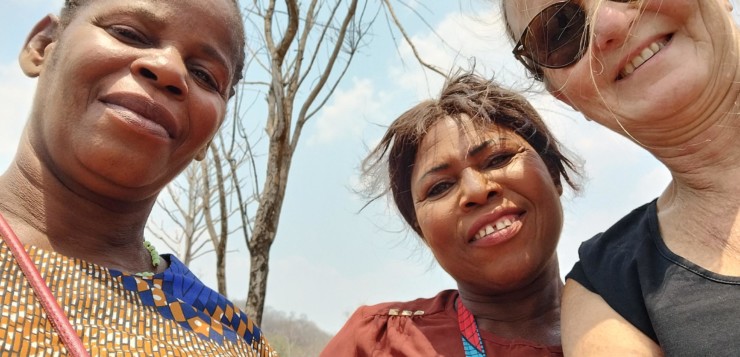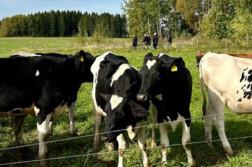Agriculture and agricultural development, through new and improved practices and value-chains, are considered as keys to societal and economic development and sustainability in Africa. As a part of EU-funded Zambia for Agroforestry, Biodiversity and Climate (Z4ABC) project, HAMK is working in collaboration with Finnish and African partners to promote ecological and socio-economic well-being by improving rural agricultural value chains in Zambia.
During October 2022, HAMK team members visited Zambia to understand the needs and challenges of the project area. Together with locals, the project’s first stage aims to find sustainable solutions and value chains to pilot in the project communities.
Day in the life of a rural Zambian lady
During the scoping trip, we had the privilege to meet Ms. Norma Grey, a divorced single mother of two, living in rural Zambia. Ms. Grey’s stories of her everyday life greatly increased our understanding of development issues and challenges in the Zambian and African rural context.
Ms. Grey shared details of her normal working week. Usually, she gets up at 5.00 am, cleans the house and makes breakfast for herself and her child. One of her two children still lives with her and attends a local secondary school. Her other child lives in the country’s capital, Lusaka. After breakfast, Ms. Grey heads to the local market to sell dried fish. She buys already dried fish once a week and resells it in the market. She usually arrives back home from the market a bit before sunset to prepare dinner. In addition to being a self-employed fish vendor, Ms. Grey is involved in chicken herding and honey production.
Time is a limiting resource
Ms. Grey told us that before herding village chicken, she used to produce charcoal for income. However, a local social enterprise, Community Markets for Conservation (COMACO), convinced her through demonstrations that village chicken requires less labor compared to charcoal production, and thus, she decided to transform her work. COMACO provided her first few chickens, and she ceased to make charcoal. COMACO also trained her and provided equipment for producing honey. Now she is using the money from selling eggs and honey for schooling her child and for general income.
Of all her livelihood activities, Ms. Grey emphasized that she prefers the honey production, as it is the least time-consuming. One just needs to establish the hive, lure the bees in, and finally harvest the honey. Bees will do rest, and most, of the work.
The main message from Ms. Grey is loud and clear. Time, mainly lack of it, is a major constraining factor in the rural livelihoods and development of Zambia. Rural habitats are involved in multiple activities to secure their livelihoods, including among others, trade, agricultural production and collection of wild fruits and other products. On top of that come the household work: cooking, cleaning, washing clothes, fetching water and firewood, and taking care of the children and elderly. People do not have time to get involved in additional labor-extensive practices, no matter how sustainable or developed they would be. On the other hand, people are interested in and eager to transform to new practices that can reduce their working effort and time.
Reduction of time-poverty needed for sustainable development
The term ‘time-poverty’ was first used and studied by C. Vickery in the 1970’s. Limited time resources are associated to trade-offs with negative impacts on well-being. Time put to agricultural practices may be away from domestic work and childcare- and the need for labor may cause children to perform various tasks at the expense of schooling. Time spent in household work and monetarily unproductive farm work is away from more productive and marketable activities, maintaining poverty. Time-poverty is especially associated with women, who in sub-Saharan Africa carry out most of the house chores. Researchers, and Hans Rosling in his popular TED talk, suggests freeing-up people’s time from basic farm- and household work to more productive activities and education.
So, what does all of this mean for practical development work and for Z4ABC project’s aim to improve agricultural practices and value chains? In addition to being ecologically and socio-economically sustainable, promoted practices and value chains need to be time- and labor-saving.
For people to adopt new practices or improve previous ones, the methods and practices need first to fit into the busy lives of locals, and secondly, free up their time to be used productively: to study, to involve in economic activities or just to relax and recharge for the next day. Time-efficient agricultural value chain practices do not just increase productivity but can also lead, through increased free time, to improved education, mental well-being, income and livelihoods in general.
While developing the Z4ABC project’s activities, we will keep Ms. Grey’s example in mind as a directing guideline.
Correction to the text on March 16th 2023: information added about the funder.
Authors
Satu Määttänen, Research assistant in HAMK Bio Research Unit. HAMK Africa Team member
Eija Laitinen, Principal Research Scientists in HAMK Bio Research Unit. She is leading the HAMK Africa Team.





Discussion1 kommentti
Pingback: Biogas cooking stoves improve everyday life of women in Africa - HAMK Beat